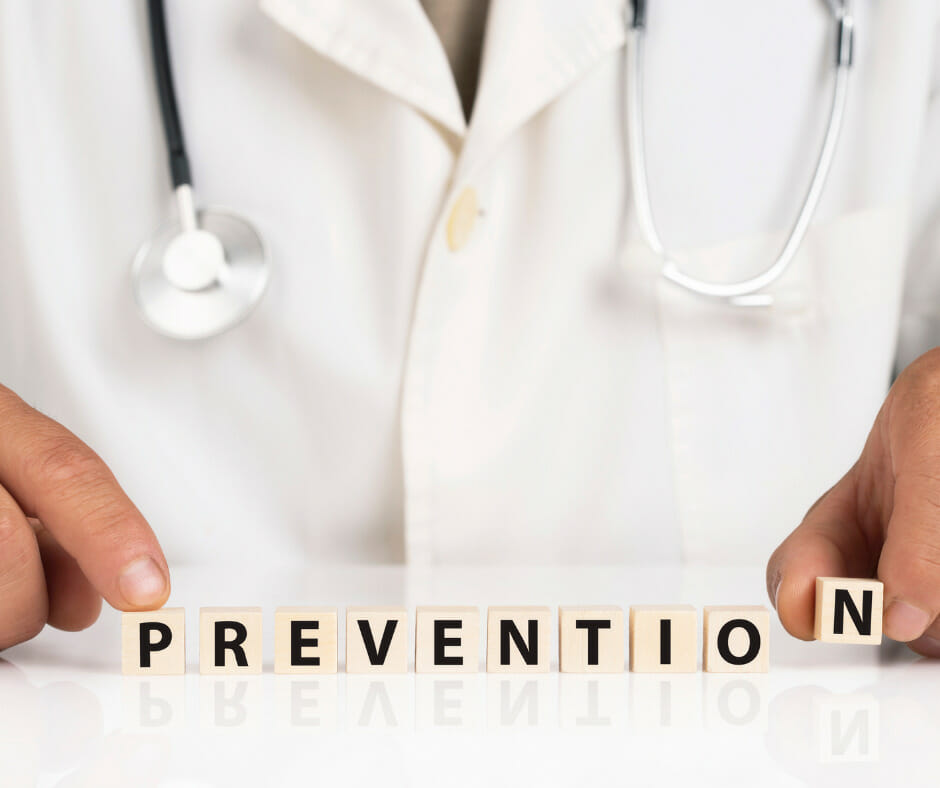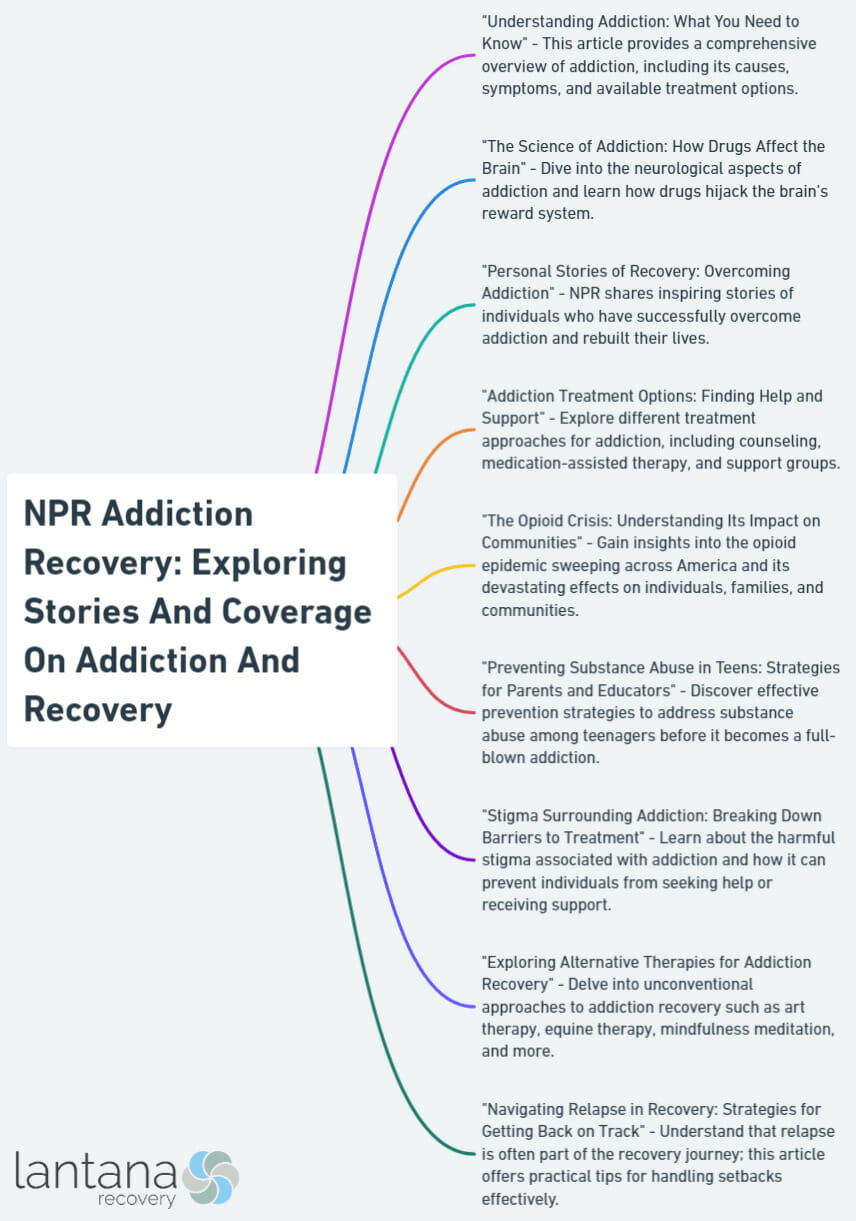NPR Addiction Recovery, an extensive resource, and platform, focuses on exploring stories and coverage related to addiction and recovery. This comprehensive guide delves into the various aspects of addiction, the importance of recovery, NPR’s coverage on addiction and recovery, personal stories of addiction and recovery, rehabilitation and treatment options, support systems, and strategies for relapse prevention.
Addiction, defined as a chronic, relapsing disorder, can manifest in various forms such as substance abuse, alcoholism, gambling addiction, and more. Addiction recovery plays a crucial role in helping individuals overcome the challenges they face and regain control of their lives.
NPR has been actively covering addiction-related topics, bringing stories and reports that shed light on the impact of addiction and showcase experts and interviews on addiction recovery. Exploring personal stories provides insights into the real-life experiences and inspiring journeys of individuals who have undergone addiction recovery.
Rehabilitation and treatment options, including various programs and therapies, are available to support individuals in their recovery journey. family and friends, as well as support groups and communities, play a vital role in providing the necessary support and encouragement. To sustain recovery, strategies for preventing relapse and building a healthy and balanced lifestyle are crucial.
By understanding and addressing the challenges of addiction recovery, individuals can embark on a transformative journey toward a healthier and more fulfilling life. Through the NPR Addiction Recovery platform, individuals can access valuable information and resources to navigate their personal journey of addiction recovery.

What Is Addiction?
Addiction, a complex and pervasive issue that affects millions, is at the core of our focus in this section. Delving into the depths of what addiction truly is, we’ll embark on an exploration that will shed light on its definition and the various types it encompasses. Brace yourself for a compelling journey that uncovers the truths surrounding addiction, as we navigate through the fascinating stories and comprehensive coverage brought to you by NPR Addiction Recovery.
Definition of Addiction
Addiction is a chronic and relapsing disorder characterized by compulsive drug use or engagement in certain behaviors despite negative consequences. It affects millions globally and is considered a brain disease that disrupts reward and motivation systems, leading to persistent cravings and loss of control.
Key aspects of addiction include the inability to stop or reduce substance use, withdrawal symptoms, and prioritization of substance use over other important aspects of life. Addiction also involves tolerance, where higher doses of the substance are needed for the desired effect.
Addiction is not limited to substances like drugs and alcohol but can also occur with behaviors such as gambling, gaming, or excessive internet use. Understanding addiction is crucial for healthcare professionals, policymakers, and those affected. It forms the basis for effective treatment, prevention, and support systems.
By recognizing addiction as a complex brain disorder, empathy and understanding can be fostered, reducing stigma and promoting evidence-based interventions to aid in the steps to recovery from drug addiction. Remember, seeking professional help and accessing support networks are vital steps in overcoming addiction and achieving sustained recovery.
Types of Addiction
Understanding the different types of addiction is crucial for providing appropriate support and treatment for individuals. Here are some common types:
- Substance addiction: This includes addictions to alcohol, legal and illegal drugs, and tobacco. Substance addiction has severe physical and psychological effects.
- Behavioral addiction: This refers to addictions unrelated to substances, such as gambling, internet use, gaming, and food consumption.
- Sexual addiction: Involves compulsive and unhealthy sexual behaviors that negatively impact life and relationships, like excessive pornography consumption, compulsive masturbation, or risky sexual activities.
- Shopping addiction: Also known as compulsive buying disorder, it involves an irresistible urge to shop and excessive spending, leading to financial difficulties and emotional distress.
- Gambling addiction: Characterized by a compulsive need to gamble, regardless of negative consequences on finances, relationships, and overall well-being.
It’s important to note that individuals may struggle with multiple types of addiction simultaneously. Each type requires specific approaches to treatment and support for recovery and overall well-being.

The Importance of Addiction Recovery
Addiction recovery is crucial for improving individual well-being and social dynamics. It enhances overall well-being, rebuilds relationships strained by addiction, and improves physical health, mental stability, and emotional resilience. Recovery also strengthens relationships by cultivating healthier and more meaningful connections with loved ones. It empowers individuals to regain productivity in various aspects of life, benefiting both themselves and society. Additionally, addiction recovery reduces societal costs, such as healthcare expenses, lost productivity, and criminal justice involvement. By emphasizing recovery and supporting individuals, society can redirect resources toward more productive endeavors where acceptance in recovery or embracing change and growth can be easier.
John, a 35-year-old father of two, struggled with addiction for over a decade. Through determination and the support of a comprehensive addiction recovery program, he overcame substance abuse issues. Today, John is a loving father, a devoted husband, and a successful professional. His recovery journey transformed his life and positively impacted his family and community. John’s story emphasizes the importance of addiction recovery and its transformative power for individuals and society.
Why is Addiction Recovery Essential?
Addiction recovery is essential for several reasons. Addiction is a chronic illness with severe physical, psychological, and social consequences. Without recovery, individuals may experience deteriorating health, strained relationships, and a decline in well-being. Addiction can also lead to financial instability and unemployment, making recovery crucial for regaining control and rebuilding futures. Additionally, addiction recovery is essential for reducing the burden on healthcare systems and society. By addressing addiction and supporting individuals on their recovery journey, we can alleviate the strain on resources and create a healthier, more productive society.
One real-life story demonstrating the importance of addiction recovery is the case of John, a successful businessman who battled alcohol addiction. John’s addiction affected his personal and professional life, causing strained relationships and a career decline. Recognizing the significance of addiction recovery, John sought treatment and enrolled in a comprehensive rehabilitation program. Through therapy, support networks, and lifestyle changes, John overcame his addiction and rebuilt his life. He regained his health, repaired relationships, and found renewed purpose in his career. John’s story illustrates the transformative power of recovery and the importance of supporting individuals on their path to healing and growth.
Benefits of Addiction Recovery
The benefits of addiction recovery, such as improved physical and mental health, strengthened relationships, and a renewed sense of purpose, are invaluable. There are several key benefits to consider:
-
Improved physical health: Addiction recovery prioritizes overall well-being by promoting healthy habits like exercise, nutrition, and rest. This leads to higher energy levels, enhanced sleep quality, and overall physical wellness.
-
Enhanced mental health: Recovery addresses underlying mental health issues and equips individuals with techniques to manage stress and negative emotions without relying on substances. As a result, mood is improved, symptoms of anxiety or depression are reduced, and resilience is increased.
-
Strengthened relationships: Recovery involves the process of rebuilding trust and repairing damaged relationships. Through therapy and support, individuals learn effective communication skills, develop empathy, and rebuild connections with loved ones. This leads to healthier and more fulfilling relationships.
-
Increased self-esteem and self-worth: Overcoming addiction boosts self-confidence and self-esteem. Achieving sobriety and making positive changes helps individuals regain control over their lives and recognize their own strengths and abilities.
-
Rediscovered purpose and fulfillment: Recovery allows individuals to reflect on their values and goals, leading to the discovery of new passions and a renewed sense of purpose. Engaging in meaningful activities, pursuing interests, and contributing to the community brings a profound sense of fulfillment and satisfaction.
It’s important to acknowledge that the benefits of addiction recovery may vary, as the journey toward recovery is unique for each individual. Seeking professional help and having a strong support system greatly enhances the chances of experiencing these benefits.

NPR’s Coverage of Addiction and Recovery
NPR takes a deep dive into the world of addiction and recovery, providing a wealth of stories, reports, and expert interviews. Unravel the struggles and triumphs of individuals as they navigate the complexities of addiction. Hear firsthand accounts that shed light on the challenges faced, while also exploring the insights shared by experts in the field of addiction recovery. Delve into NPR’s comprehensive coverage that offers a compelling glimpse into this important topic.
Stories and Reports on Addiction
Stories and reports on addiction are valuable resources that offer insights into the realities and challenges faced by individuals struggling with addiction. These narratives shed light on the experiences and circumstances that contribute to addiction, raising awareness and reducing stigma. They also educate the public about the complexities of addiction.
Through these narratives, we gain a deeper understanding of the personal struggles, triumphs, and resilience of those battling addiction. These stories highlight the impact on individuals, families, and communities, revealing the devastating consequences as well as the potential for recovery.
By sharing these stories, we encourage empathy and compassion, fostering understanding and support for those affected by addiction. Reports on addiction provide a platform for experts to share their knowledge and findings, advancing our understanding of prevention, treatment, and recovery strategies.
It is important to listen to these stories and reports with an open mind, recognizing that each person’s journey is unique. By amplifying these voices, we inspire hope, drive policy changes, and promote accessible and evidence-based addiction treatment and support services. For more information, check out NPR Addiction Recovery: Exploring Stories and Coverage on Addiction and Recovery.
One true story that stands out is Sarah’s brave account of her addiction journey. By sharing her story, she raised awareness and inspired others. Many individuals facing similar battles found her story relatable and it helped them seek help and begin their own recovery journeys. Sarah’s story exemplified the challenges of addiction and showcased the possibility of recovery, demonstrating the power of sharing addiction stories.
Experts and Interviews on Addiction Recovery
Experts and interviews play a crucial role in the process of addiction recovery. They offer numerous benefits that contribute to successful rehabilitation:
-
Professional guidance: Addiction recovery experts possess extensive knowledge and experience in the field. Their expertise enables them to help individuals comprehend the underlying causes of their addiction and formulate personalized strategies for recovery.
-
Evidence-based approaches: Experts rely on research and evidence to provide sound advice. They constantly stay updated on the latest effective interventions and therapies available in the field of addiction recovery.
-
Specialized knowledge: Conducting interviews with professionals such as psychologists, counselors, doctors, and addiction specialists allows for a diverse range of perspectives on addiction recovery. This diverse insight contributes to a comprehensive understanding of the complexities surrounding addiction and its treatment.
-
Real-life experiences: Interviews with individuals who have successfully overcome addiction serve as sources of inspiration and motivation for others seeking recovery. Their personal stories provide hope, encouragement, and proof that overcoming addiction is achievable.
-
Education and awareness: Experts and interviews contribute to the dissemination of knowledge and the reduction of stigma surrounding addiction. By promoting understanding and empathy, they help increase awareness about this issue in society.
To ensure effective addiction recovery, it is vital to seek individualized treatment plans and professional advice. The guidance provided by experts and experiences shared through interviews can significantly enhance one’s journey toward a life free from addiction.

Exploring Personal Stories of Addiction and Recovery
Delve into the raw and inspiring world of addiction and recovery as we explore personal stories that resonate on a deeply human level. From real-life experiences to inspiring recovery journeys, these sub-sections will take you on a rollercoaster ride of emotions, shedding light on the triumphs and struggles faced by those grappling with addiction. Prepare to be moved, motivated, and inspired by the resilience and strength displayed by individuals in their personal battles against addiction.
Real-life Experiences
Real-life experiences are invaluable for gaining insight into addiction and recovery with institutions like Lantana Recovery, Greenville. These experiences shed light on the unique challenges individuals face and the strategies they employ to overcome addiction. Here are several real-life experiences that beautifully illustrate the journey of addiction and recovery:
-
Sarah, a courageous recovering addict, openly shares her story of grappling with opioid addiction and her path toward sobriety. She candidly discusses the hardships she encountered, the impact on her relationships, and the proactive measures she took to seek professional assistance and support.
-
John, a former alcoholic, vulnerably recounts his battle with addiction and the pivotal moment that compelled him to seek help. He candidly shares his encounters with rehabilitation, which encompassed the detoxification process and therapeutic sessions. John strongly emphasizes how imperative it is to cultivate a robust support system, as it played a fundamental role in his recovery.
-
Jessica, a determined young adult who conquered a gambling addiction, bravely reveals her journey from hitting rock bottom to reclaiming control over her life. She openly describes her participation in support groups, therapy sessions, and the implementation of healthy coping mechanisms to prevent relapse.
-
Mark, a tenacious individual in recovery from drug addiction, candidly shares the hurdles he encountered during his voyage to sobriety. He openly reflects on his experiences with relapse, underscoring the significance of perseverance and self-examination in maintaining lasting recovery.
-
Emily, an empathetic family member of someone grappling with addiction, earnestly discloses the impact it had on her life and the lengths she went to support her loved one’s path to recovery. She strongly emphasizes the importance of education, understanding, and empathy in guiding individuals along their journey to regain wellness.
These genuine accounts of personal experiences vividly depict the intricacies of addiction and the unwavering resilience required to triumph over it. They serve as inspirations for those engaged in their own battles against addiction and offer crucial lessons for society as a whole.
Inspiring Recovery Journeys
Incorporating inspiring recovery journeys within addiction recovery is crucial. These journeys serve as a beacon of hope and motivation for individuals facing addiction, showcasing their personal resilience and the potential for transformation.
1. Personal triumphs: Individuals who have successfully overcome addiction graciously share their stories, shedding light on the challenges they encountered and the strategies they implemented to achieve sobriety. These accounts not only inspire others but also provide practical insights into the recovery journey.
2. Breaking the stigma: Inspiring recovery journeys effectively challenge societal stereotypes and misconceptions surrounding addiction. By openly sharing their experiences, individuals help dismantle the stigma associated with addiction, fostering an environment where others can seek help without judgment or shame.
3. Role models for others: Those who have triumphantly recovered from addiction become powerful role models for those still struggling. Their stories inspire individuals during the difficult periods of their own recovery, demonstrating that a fulfilling, drug-free life is indeed attainable.
4. Motivation for change: Inspiring recovery journeys serve as a constant reminder that individuals possess the ability to transform their lives for the better. These stories motivate individuals to seek professional treatment, actively engage in therapy, and adopt healthier coping mechanisms.
5. Building a supportive community: By sharing their recovery journeys, individuals foster a sense of community among fellow individuals in recovery and their loved ones. These narratives connect people who genuinely understand and empathize with each other’s struggles, creating a strong support network that sustains long-term recovery.
In essence, inspiring recovery journeys offer hope, motivation, and guidance to individuals grappling with addiction. Through authentic storytelling and personal experiences, they powerfully demonstrate that recovery is attainable and inspire others to embark on their own transformative journeys toward a healthier, drug-free life.

Rehabilitation and Treatment Options for Addiction
Looking for the right rehabilitation and treatment options for addiction? Dive into the world of addiction recovery with NPR Addiction Recovery. Discover the varied types of addiction treatment programs available and explore the transformative power of therapies and interventions in the journey toward recovery. Get ready to explore the stories, the coverage, and the insights that NPR brings to the table in this compelling section.
Types of Addiction Treatment Programs
There are various types of addiction treatment programs available to support individuals in their journey toward sobriety. Here are some different types of addiction treatment programs:
-
Inpatient Rehab Programs: These programs provide structured and intensive treatment. Individuals reside in a facility for a certain period and receive 24/7 support, as well as access to medical and therapeutic services for addressing their addiction.
-
Outpatient Rehab Programs: These programs allow individuals to live at home while attending scheduled treatment sessions during the day. They provide flexibility and are suitable for those with milder addictions or work/family commitments.
-
12-Step Programs: These programs involve group meetings and the twelve-step recovery model, such as Alcoholics Anonymous (AA) and Narcotics Anonymous (NA). They offer peer support, accountability, and guidance throughout the recovery process. Studies like Spirituality-Based Recovery From Drug Addiction in the Twelve-Step Fellowship of Narcotics Anonymous by Galanter, M.D., et al., have shown that long-term recovery from drug addiction can be facilitated by a combination of spiritual renewal and an abstinence-oriented approach, within the supportive social context of Narcotics Anonymous.
-
Detoxification Programs: Detox programs assist individuals in safely managing withdrawal symptoms when stopping substance use. Medical professionals monitor the process and may provide medications to alleviate discomfort and ensure safe detoxification.
-
Dual Diagnosis Programs: These programs address both addiction and co-occurring mental health disorders. They offer integrated treatment that focuses on both conditions simultaneously for a comprehensive recovery.
-
Holistic Treatment Programs: Holistic programs consider the physical, mental, and spiritual aspects of an individual. They often include alternative therapies such as yoga, meditation, and acupuncture to complement traditional treatment methods.
When choosing a treatment program, it’s important to consider individual needs and preferences, as well as the level of care required, the substance of abuse, and personal circumstances.
Therapies and Interventions for Recovery
When it comes to addiction recovery, there are various essential therapies and interventions that can help individuals on their journey toward sobriety and overall well-being. These therapies and interventions are designed to tackle the root causes of addiction and assist in the development of healthier coping mechanisms. Here are several effective options for recovery:
1. Cognitive-Behavioral Therapy (CBT): CBT plays a crucial role in transforming negative thoughts and behaviors that are associated with addiction. This therapy focuses on teaching coping skills, and problem-solving techniques, and empowering individuals to prevent relapse.
2. Contingency Management: This intervention utilizes positive reinforcement strategies, such as rewards or privileges, to motivate individuals to abstain from addictive behaviors or engage in positive actions. By reinforcing abstinence, this approach encourages recovery and generates motivation.
3. Motivational Interviewing (MI): MI is designed to help individuals overcome their ambivalence about making changes in their lives. The primary goal is to enhance motivation for treatment and facilitate positive transformations.
4. Group Therapy: Group therapy establishes a supportive environment where individuals can freely share their experiences, receive valuable feedback, and learn from others who have encountered similar challenges. This approach aids in the development of essential interpersonal skills while fostering a sense of belonging.
5. Family Therapy: Involving family members in the treatment process is integral to achieving a successful recovery. Family therapy specifically addresses relationship dynamics, improves communication, and provides support to both the individual and their loved ones.
6. Medication-Assisted Treatment (MAT): MAT combines appropriate medications, such as methadone or buprenorphine, with counseling and various therapies. This comprehensive approach is particularly effective for individuals struggling with opioid or alcohol dependence, as it not only reduces cravings but also alleviates withdrawal symptoms.
These therapies and interventions are vital in promoting long-term sobriety and overall well-being. The selection of a particular therapy will depend on the individual’s unique needs, preferences, and the type and severity of their addiction. Consulting healthcare professionals or addiction specialists will help determine the most suitable approach for each individual’s recovery process.
Support Systems for Addiction Recovery
Discover the power of support systems in addiction recovery. Learn how the involvement of family and friends can play a crucial role, while support groups and communities provide a sense of belonging and understanding. From personal stories to expert insights, delve into the profound impact that these support systems have on the journey to recovery.
Family and Friends’ Role in Recovery
“Support from family and other social network elements can be important in helping patients to cope with practical and emotional consequences of diseases” (Perceived family cohesion, social support, and quality of life in patients undergoing treatment for substance use disorders compared with patients with mental and physical disorders, Birkeland et al., 2021.) The support and involvement of family and friends greatly contribute to the success of the recovery journey:
- Family and friends provide emotional support by showing empathy, understanding, and encouragement. This boosts their loved one’s morale and motivation to stay in recovery.
- Creating a stable and supportive environment is essential. Family and friends can help by removing triggers and negative influences and providing a safe space for healing and growth.
- Practical assistance from family and friends can greatly help with daily responsibilities such as transportation, childcare, or financial support. This relieves stress and allows the individual to focus on recovery.
- Family and friends can attend support groups or therapy sessions with their loved one, reinforcing the importance of the recovery journey.
- Family and friends can serve as positive role models by maintaining healthy habits and practicing self-care. This inspires the individual to adopt healthy behaviors and lifestyle choices.
A true story highlights the importance of family and friends in recovery. Sarah, who struggled with addiction, was able to overcome it and rebuild her life thanks to her family and friends’ unwavering support. Their emotional support, attendance at therapy sessions, and creation of a stable environment were instrumental in her recovery. Sarah continues to thrive in her sobriety journey, inspired by the love and support of her family and friends.
Support Groups and Communities
Support groups and communities play a crucial role in the process of addiction recovery. These groups provide a nurturing environment where individuals can receive mutual support and understanding from others who are going through similar struggles. Additionally, they offer valuable knowledge and effective strategies to help individuals overcome their addictions.
By fostering a sense of accountability, support groups and communities encourage individuals to take responsibility for their actions and choices. Furthermore, these groups help reduce the stigma associated with addiction and eliminate feelings of isolation. By forming long-term connections with others who are on a similar journey, individuals are more likely to maintain their sobriety in the long run.
Research has consistently shown that actively participating in support groups and communities significantly increases the chances of achieving and sustaining long-term recovery from addiction.

Preventing Relapse and Sustaining Recovery
Preventing relapse and sustaining recovery is crucial in addiction treatment. In this section, we’ll dive into effective strategies for relapse prevention, helping individuals navigate the challenges they may face after initial recovery. Additionally, we’ll explore how building a healthy and balanced lifestyle plays a pivotal role in long-term recovery success. So, let’s discover practical insights and evidence-backed approaches to support individuals on their journey to lasting sobriety.
Strategies for Relapse Prevention
Implementing strategies for relapse prevention is crucial in addiction recovery. Here are some effective strategies to consider for relapse prevention:
1. Identify triggers: Recognize people, places, or situations that may tempt you to relapse. Avoid these triggers or develop coping mechanisms to prevent relapse. Gila Chen explains in The Meaning of Suffering in Drug Addiction and Recovery from the Perspective of Existentialism, Buddhism and the 12-Step Program that negative emotions can trigger primary suffering, leading individuals towards substance abuse. As addiction progresses over time, it exacerbates the problem, causing secondary suffering.
2. Build a support network: Surround yourself with a strong support system consisting of family, friends, and support groups. They can provide encouragement, accountability, and assistance during challenging times.
3. Develop healthy coping mechanisms: Find alternative ways to manage stress, anxiety, and negative emotions without substance use. Practice mindfulness, engage in physical activities, or pursue creative outlets.
4. Adhere to healthy routines: Establish a structured daily routine with regular sleep patterns, nutritious meals, exercise, and self-care activities. This promotes physical and emotional well-being, reducing the likelihood of relapse.
5. Seek professional help: Utilize therapy or counseling services to address underlying issues contributing to addiction and learn effective coping strategies. Cognitive-behavioral therapy, for example, can challenge and modify harmful thought patterns.
6. Practice self-reflection: Regularly reflect on your progress, achievements, and challenges in recovery. This self-awareness can alert you to potential risk factors and motivate you to continue working towards your goals.
7. Develop a relapse prevention plan: Collaborate with a healthcare professional or therapist to create a comprehensive relapse prevention plan. This plan should include specific steps to take in case of potential relapse, such as contacting support systems or attending therapy sessions.
By implementing these strategies, individuals in addiction recovery can increase their chances of maintaining long-term sobriety and overall well-being.
Building a Healthy and Balanced Lifestyle
Building a healthy and balanced lifestyle is crucial for individuals recovering from addiction. It incorporates key elements such as physical activity, nutrition, sleep, stress management, social support, mindfulness, and self-care.
1. Physical activity: Regular exercise is essential as it boosts overall well-being, promotes a healthy body, and reduces stress and anxiety. Engaging in activities like walking, jogging, or yoga aids in building a healthy and balanced lifestyle.
2. Nutrition: A balanced diet is important for the body’s healing process and optimal functioning. It includes consuming fruits, vegetables, lean proteins, and whole grains. By incorporating these food groups, individuals can support their recovery journey.
3. Sleep: Sufficient and quality sleep plays a vital role in recovery. Establishing a consistent sleep schedule and practicing good sleep hygiene enhances energy levels, overall well-being, and contributes to building a healthy lifestyle.
4. Stress management: Finding healthy ways to manage stress is crucial during the recovery journey. Techniques like deep breathing exercises, meditation, or engaging in hobbies provide effective stress relief. These methods help individuals cope with stressors without resorting to unhealthy behaviors.
5. Social support: Building a positive and supportive network is key for emotional support and preventing relapse. Surrounding oneself with a strong support system aids in the recovery process and contributes to a healthy and balanced lifestyle.
6. Mindfulness: Practicing mindfulness techniques such as meditation or journaling assists in staying present and focused on the recovery journey. It enables individuals to engage in self-reflection, develop self-awareness, and reduce negative thoughts.
7. Self-care: Prioritizing self-care activities like hobbies, relaxation, or personal interests is crucial for promoting positive mental health and overall well-being. Engaging in self-care practices helps individuals maintain a healthy and balanced lifestyle.
Building a healthy and balanced lifestyle allows individuals to cultivate physical, mental, and emotional well-being. It aids in their recovery journey and enhances their overall quality of life.

Frequently Asked Questions
What is NPR’s Addiction Recovery coverage about?
NPR’s Addiction Recovery coverage explores stories and topics related to drug addiction and recovery. This includes tackling the stigma surrounding addiction and mental health, highlighting successful recovery stories, discussing different recovery models, and exploring harm reduction programs.
What are the challenges faced by individuals leaving drug treatment programs?
Individuals leaving drug treatment programs often face challenges such as finding housing, employment, and healthcare. Starting from scratch in these areas can be overwhelming. Additionally, the memory of using drugs to cope with problems can be a difficult aspect of recovery.
What is SAMHSA’s National Helpline and how can it help?
SAMHSA’s National Helpline is a free and confidential treatment referral and information service available 24/7. It provides support in English and Spanish and offers referrals to local treatment facilities, support groups, and community-based organizations. The helpline can be reached at 1-800-662-HELP (4357) or TTY: 1-800-487-4889. Online treatment locators and text message services are also available.
Is recovery from addiction possible?
Yes, recovery from addiction is possible. Multiple studies have shown that the majority of Americans who experience addiction eventually recover and go on to live full and healthy lives. Recovery can be a slow process, often taking several years with high-quality treatment and medical care.
What challenges exist in accessing addiction treatment?
Challenges in accessing addiction treatment can include limited access to healthcare, racial bias, and insufficient funding for treatment programs. Additionally, the presence of fentanyl, a deadly synthetic opioid, in street drugs poses a significant risk of fatal overdoses, making it crucial to provide harm reduction resources.
What resources are available for individuals and families dealing with addiction?
SAMHSA’s National Helpline offers referrals to treatment facilities, support groups, and community-based organizations. They also provide helpful resources such as booklets for families dealing with substance abuse, information on the role of family therapy in recovery, and resources for teens with parents who abuse alcohol or drugs.









